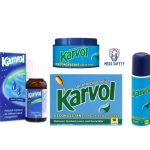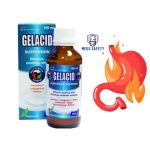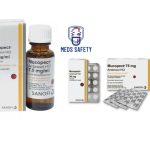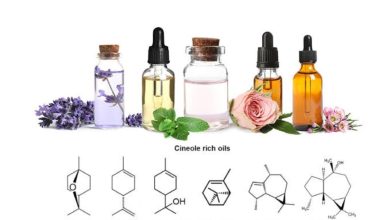Olbas Oil: Ingredients, Uses, Dosage, Side Effects, Interactions, FAQs
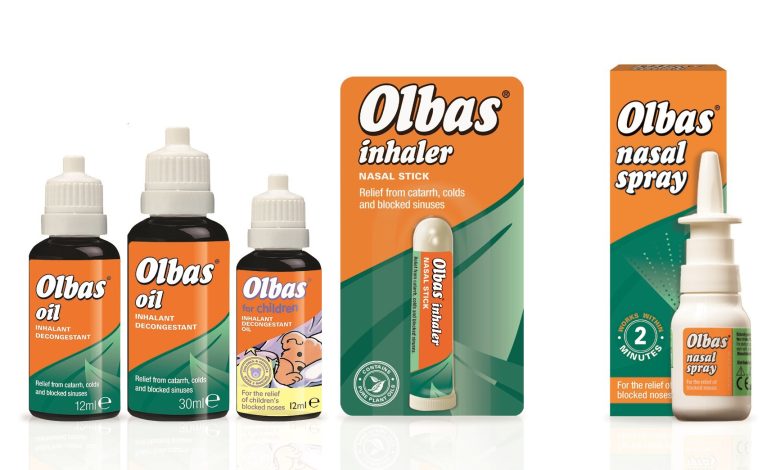
What is Olbas Oil?
Olbas Oil is a popular aromatic inhalant and topical natural remedy used to relieve symptoms of nasal congestion, sinusitis, and respiratory issues. It is a blend of essential oils that have been used for decades to provide temporary relief from common colds, coughs, and blocked noses.
The main ingredients of Olbas Oil typically include a combination of essential oils such as:
1. Peppermint Oil: Peppermint oil is derived from the peppermint plant, known scientifically as Mentha × piperita. It has been used for centuries for its various therapeutic properties. One of its key components is menthol, which gives peppermint its distinctive cooling sensation. When inhaled, peppermint oil’s soothing and refreshing aroma can help open up the airways and provide relief from nasal congestion. Its decongestant properties make it particularly useful in easing breathing difficulties caused by colds, flu, or allergies. Furthermore, peppermint oil’s analgesic properties can help alleviate headaches and muscle aches that sometimes accompany respiratory issues.
2. Eucalyptus Oil: Eucalyptus oil is derived from the leaves of eucalyptus trees, primarily species of the Eucalyptus genus, such as Eucalyptus globulus. It is widely recognized for its respiratory benefits and is a common ingredient in many cold and cough remedies. Eucalyptus oil contains a compound called cineole (or eucalyptol), which acts as an expectorant, helping to loosen mucus and phlegm in the respiratory tract. This makes it easier to expel the accumulated mucus, relieving congestion and promoting clearer breathing. The inhalation of eucalyptus oil vapor can also have a soothing effect on the throat and may provide some relief from coughs.
3. Cajeput Oil: Cajeput oil is obtained from the leaves of the cajeput tree (Melaleuca leucadendron or Melaleuca cajuputi), which is native to Southeast Asia and Australia. Like other essential oils, cajeput oil possesses antiseptic properties, meaning it can help prevent the growth of bacteria and other microorganisms. This makes it useful for respiratory issues since it can help reduce the risk of secondary infections that may exacerbate symptoms. Cajeput oil is also an expectorant, which means it aids in the expulsion of mucus and phlegm, thus easing breathing and promoting respiratory comfort.
4. Wintergreen Oil: Wintergreen oil is extracted from the leaves of the Gaultheria procumbens plant, a species native to North America. The oil contains methyl salicylate, a compound with analgesic (pain-relieving) properties. When applied topically, wintergreen oil can create a mild warming sensation, which may provide temporary relief from muscle aches and discomfort associated with respiratory issues. While it is not a primary ingredient in Olbas Oil, its inclusion can contribute to the overall soothing effect of the blend.
5. Juniper Berry Oil: Juniper berry oil is derived from the berries of the juniper plant, known as Juniperus communis. This oil has a long history of traditional use as a natural remedy for respiratory ailments. It possesses antiseptic and antibacterial properties, which can be beneficial in supporting respiratory health. By helping to combat harmful microorganisms, juniper berry oil may contribute to a healthier respiratory environment. It is often included in Olbas Oil to provide additional respiratory support.
6. Clove Oil: Clove Oil, with its warm and spicy aroma, serves as a complementary ingredient in Olbas Oil, enhancing the overall aromatic experience. When combined with the other essential oils, clove oil contributes to the comforting and soothing scent of Olbas Oil, providing a well-rounded sensory experience for users. Additionally, clove oil itself possesses its own therapeutic properties, such as potential antioxidant and analgesic effects, making it a valuable addition to the blend, further supporting the overall benefits of Olbas Oil for respiratory relief and relaxation.
How Does Olbas Oil Work?
Olbas Oil works by combining essential oil’s decongestant, expectorant, antiseptic, and aromatic properties to offer temporary relief from respiratory symptoms and nasal congestion. Peppermint and eucalyptus oil open up airways, while eucalyptus and cajeput oil act as expectorants, loosening mucus for easier expulsion. Cajeput and juniper berry oil’s antiseptic properties help prevent secondary infections. Inhalation of Olbas Oil’s aromatic vapors soothes and clears airways. Wintergreen oil also provides a mild analgesic effect for muscle discomfort. While Olbas Oil eases symptoms, it does not cure underlying respiratory conditions, and medical advice should be sought for persistent issues.
How To Use Olbas Oil
Olbas Oil can be used in several ways to provide relief from respiratory symptoms and promote a sense of well-being. Here are the most common methods of using Olbas Oil:
1. Inhalation: Inhalation is one of the most effective ways to use Olbas Oil for respiratory relief. You can simply inhale the vapors of the oil to experience its benefits. Here’s how to do it:
• Add 2-3 drops of Olbas Oil to a tissue or handkerchief.
• Hold the tissue close to your nose and take slow, deep breaths, inhaling the aromatic vapors.
• The soothing and refreshing aroma of Olbas Oil can help clear your nasal passages and ease breathing.
2. Steam Inhalation: This method is particularly helpful for relieving congestion and opening up the airways:
• Boil a pot of water and remove it from the heat source.
• Add a few drops of Olbas Oil to the hot water.
• Carefully lean over the pot, covering your head with a towel to create a tent-like enclosure that traps the steam.
• Inhale deeply through your nose, breathing in the steam infused with Olbas Oil.
• Be cautious not to get too close to the hot water to avoid burns.
3. Topical Application: Olbas Oil can be applied topically, usually as a massage oil, to provide soothing relief for muscle aches and discomfort associated with respiratory issues:
• Dilute Olbas Oil with a carrier oil (such as coconut oil or almond oil) in a 1:1 ratio or as directed on the product label.
• Gently massage the diluted Olbas Oil onto your chest, throat, or back. The oil’s aromatic properties can help promote a sense of comfort and ease.
4. Aromatherapy Diffuser: If you have an aromatherapy diffuser, you can use Olbas Oil to fill your living space with its pleasant aroma. Follow the instructions provided with your diffuser to add the appropriate amount of Olbas Oil and let it disperse throughout the room.
5. Personal Care Products: Some Olbas Oil products, such as inhalers or balms, come in convenient, ready-to-use forms for personal care. Follow the specific instructions provided on the product’s packaging.
Remember to use Olbas Oil as directed on the product label or as advised by your healthcare professional. While Olbas Oil can provide temporary relief from respiratory symptoms, it is not a replacement for medical treatment. If you have severe or persistent respiratory issues, it’s essential to seek medical advice from a healthcare professional.
Side Effects
Olbas Oil is generally considered safe when used as directed, and most people do not experience any adverse side effects. However, like any essential oil or product, some individuals may be sensitive or allergic to certain components in Olbas Oil. If you experience any adverse reactions, discontinue use immediately and seek medical attention if necessary. Here are some potential side effects or precautions to be aware of:
1. Skin Irritation: Applying undiluted Olbas Oil directly to the skin can cause irritation in some individuals. To avoid this, always dilute the oil with a carrier oil before topical application. Perform a patch test on a small area of skin first to check for any allergic reactions.
2. Eye Irritation: Avoid direct contact with the eyes when using Olbas Oil. If the oil comes into contact with the eyes, rinse thoroughly with water and seek medical attention if irritation persists.
3. Respiratory Sensitivity: While Olbas Oil is commonly used for respiratory relief, some people may be sensitive to strong aromas. If you experience any discomfort, dizziness, or difficulty breathing when inhaling the vapors, discontinue use and move to an area with fresh air.
4. Allergic Reactions: Some individuals may be allergic to specific essential oils used in Olbas Oil, such as peppermint or eucalyptus oil. If you have known allergies to these oils or any other ingredients in Olbas Oil, avoid using it.
5. Children and Infants: Olbas Oil should be used with caution in children and infants, as they can be more sensitive to essential oils. It’s best to consult with a pediatrician before using Olbas Oil on young children or babies.
6. Ingestion: Olbas Oil is not intended for internal use and should not be ingested. Swallowing essential oils can be harmful and lead to serious health issues.
As with any new product, it’s advisable to perform a patch test and start with a small amount to assess your individual sensitivity before using Olbas Oil more extensively.
If you experience any severe or persistent side effects after using Olbas Oil, seek medical attention immediately. In case of accidental ingestion or other emergencies, contact your local poison control center or seek medical assistance promptly.
Drug Interactions
Olbas Oil, like other essential oils, may potentially interact with certain medications or medical conditions. Although Olbas Oil is primarily used for topical application or inhalation, some interactions may still occur. It’s important to exercise caution and consult with a healthcare professional if you are taking medications or have specific health conditions. Here are some considerations regarding potential drug interactions:
1. Anticoagulants (Blood Thinners): Some essential oils, including wintergreen oil found in Olbas Oil, contain compounds that can have antiplatelet or anticoagulant effects, which may interfere with blood clotting. If you are taking anticoagulant medications like warfarin or aspirin, using Olbas Oil topically or in large amounts may increase the risk of bleeding or bruising. Consult your healthcare provider before using Olbas Oil if you are on blood-thinning medications.
2. Antiplatelet Drugs: Similar to anticoagulants, essential oils with antiplatelet properties may interact with antiplatelet drugs like clopidogrel. This combination may also increase the risk of bleeding.
3. Asthma and Respiratory Medications: If you are using medications for asthma or other respiratory conditions, it’s best to consult with your healthcare provider before using Olbas Oil. While Olbas Oil is often used for respiratory relief, some individuals with respiratory conditions may be sensitive to strong aromas or certain essential oils.
4. Topical Medications: When using Olbas Oil topically, be cautious if you are using other topical medications or creams on the same area. There is a possibility of skin irritation or interactions between the substances.
5. Herbal Supplements and Other Essential Oils: If you are taking other herbal supplements or using other essential oils, there is a potential for interactions. Always discuss the use of Olbas Oil with your healthcare provider to ensure there are no contraindications with other substances you are using.
6. Medical Conditions: If you have specific medical conditions such as allergies, skin sensitivities, or respiratory disorders, it’s essential to consult your healthcare provider before using Olbas Oil to ensure it is safe for you.
Remember, essential oils are concentrated plant extracts, and while they can offer various benefits, they should be used with care, especially when it comes to potential interactions with medications or health conditions. Always follow the recommended usage and dilution guidelines for Olbas Oil, and if you have any concerns or questions about using it, consult with a healthcare professional for personalized advice.
Frequently Asked Questions
Q: What is Olbas Oil used for?
A: Olbas Oil is a blend of essential oils known for its soothing and decongestant properties. It is commonly used to provide temporary relief from respiratory symptoms, nasal congestion, and related discomforts such as coughs and chest congestion. The inhalation of Olbas Oil’s aromatic vapors can help open up airways, ease breathing, and promote a sense of well-being.
Q: How do I use Olbas Oil?
A: Olbas Oil can be used in several ways. For inhalation, add 2-3 drops to a tissue or handkerchief and inhale the vapors. Alternatively, for steam inhalation, add a few drops to hot water, create a tent-like enclosure with a towel, and inhale the steam. For topical application, dilute Olbas Oil with a carrier oil and massage it onto the chest, throat, or back. It can also be used in an aromatherapy diffuser or as a personal care product like inhalers or balms.
Q: Is Olbas Oil safe for children and infants?
A: Olbas Oil should be used with caution in children and infants, as they can be more sensitive to essential oils. It’s best to consult with a pediatrician before using Olbas Oil on young children or babies to ensure safe and appropriate usage.
Q: Can I ingest Olbas Oil?
A: No, Olbas Oil is not intended for internal use and should not be ingested. Swallowing essential oils can be harmful and lead to serious health issues. Olbas Oil is meant for external use through inhalation or topical application only.
Q: Are there any side effects of using Olbas Oil?
A: While Olbas Oil is generally safe when used as directed, some individuals may experience skin irritation or allergic reactions to certain essential oils in the blend. It is essential to perform a patch test before topical application and discontinue use if any adverse reactions occur. Additionally, people with specific medical conditions or allergies should consult with a healthcare professional before using Olbas Oil.
Q: Can Olbas Oil cure respiratory conditions?
A: Olbas Oil provides temporary relief from respiratory symptoms and discomforts, but it is not a cure for underlying respiratory conditions. It offers comfort and support for respiratory health but should not replace medical treatment or advice from a healthcare professional.
Q: Are there any drug interactions with Olbas Oil?
A: Yes, Olbas Oil may interact with certain medications, especially anticoagulants (blood thinners) and asthma or respiratory medications. It’s essential to consult with a healthcare provider if you are taking medications or have specific health conditions before using Olbas Oil.
Q: Can you use Olbas Oil when pregnant or nursing a child?
A: Pregnant or nursing women should consult their healthcare provider before using Olbas Oil, as certain essential oils may not be safe during pregnancy or lactation. It’s essential to seek medical advice to ensure safe usage during this time.
Q: How long does Olbas Oil’s aroma last?
A: The duration of Olbas Oil’s aroma can vary depending on factors such as the amount used, method of application, and individual sensitivity. In general, the aromatic effects may last for several hours, providing continuous relief during that time.
Q: Is Olbas Oil addictive?
A: No, Olbas Oil is not addictive. It is a natural remedy made from essential oils, and its use does not lead to dependency or addiction.
Q: Can Olbas Oil be used for allergies?
A: Olbas Oil may provide some relief for allergy-related symptoms, such as nasal congestion and difficulty breathing. The decongestant and expectorant properties of the essential oils in Olbas Oil can help open up airways and reduce congestion caused by allergies. However, it’s essential to remember that Olbas Oil offers temporary relief and does not address the underlying cause of allergies. Allergy sufferers should also identify and avoid specific allergens, and if symptoms persist or worsen, it is advisable to seek medical advice.
Q: How often can I use Olbas Oil?
A: The frequency of Olbas Oil usage can vary depending on individual needs and preferences. For inhalation, you can use it whenever you feel congested or need respiratory relief. For topical application, follow the instructions on the product label or as advised by your healthcare provider. Avoid excessive use, and if you have any concerns, consult with a healthcare professional.
Q: Can Olbas Oil be used for headaches?
A: While Olbas Oil is not specifically formulated for headaches, some people find relief from headaches or tension-related discomfort when using it. The cooling and soothing effects of peppermint oil in Olbas Oil may contribute to headache relief when applied to the temples or forehead. However, for chronic or severe headaches, it is essential to address the underlying cause and consult with a healthcare provider for appropriate treatment.
Q: Can I use Olbas Oil with other essential oils?
A: Using Olbas Oil in combination with other essential oils is possible, but it’s essential to be cautious of potential interactions or sensitivities. Some essential oils may have similar properties to those in Olbas Oil, while others may have different effects. Always perform a patch test when using a new combination of essential oils and consult with a qualified aromatherapist or healthcare professional if uncertain.
Q: Can Olbas Oil be used during pregnancy for morning sickness relief?
A: Pregnant women should exercise caution when using essential oils during pregnancy, as some oils may not be safe during this time. While Olbas Oil is generally considered safe for inhalation and topical use in low concentrations, pregnant women should consult their healthcare provider before using it for morning sickness relief. It’s advisable to seek guidance on safe essential oil usage during pregnancy and opt for other non-medicated remedies to alleviate morning sickness.
Q: Is Olbas Oil safe for pets?
A: Olbas Oil is formulated for human use, and essential oils can be toxic to pets, especially when ingested or applied topically in concentrated forms. Therefore, it is essential to keep Olbas Oil and other essential oils away from pets, and never use them on or around animals without specific instructions from a veterinarian experienced in essential oil usage for pets.
Always remember that individual responses to essential oils may vary, and it’s crucial to use Olbas Oil responsibly, following the recommended guidelines and seeking professional advice when needed.
Q: Can I put Olbas Oil on my baby’s clothes?
A: No, It is generally not recommended to put Olbas Oil or any essential oils directly on a baby’s clothes, especially without dilution. Babies have sensitive skin, and undiluted essential oils can cause skin irritation or allergic reactions. Instead, it is best to avoid direct contact with a baby’s skin and clothing and to use Olbas Oil with caution around infants.
Q: Why has Olbas Oil been discontinued?
A: Olbas Oil remains available and has not been discontinued. However, the manufacturer of Olbas Pastilles (a herbal cough drop) has discontinued their production, resulting in their unavailability at present. Please note that while Olbas Pastilles are no longer being produced, Olbas Oil, the aromatic inhalant and topical remedy, is still available for purchase. If you have been using Olbas Pastilles and are looking for an alternative, you may consider exploring other Olbas Oil products or consulting with a healthcare professional for suitable alternatives to meet your needs.
Q: What are the ingredients in Olbas Oil?
A: The composition of Olbas Oil includes a combination of essential oils with their respective percentages: Cajuput Oil 18.50%, Clove Oil 0.1%, Eucalyptus Oil 35.45%, Juniperberry Oil 2.7%, Peppermint oil (Levomenthol) 4.1%, Wintergreen Oil (Methyl Salicylate) 3.7%, and Mint Oil (partly dementholised) 35.45%. Each oil contributes to the unique properties of Olbas Oil, with Cajuput Oil and Eucalyptus Oil providing decongestant and expectorant effects, Clove Oil adding to the aromatic experience, Juniperberry Oil supporting respiratory health with its antiseptic properties, Peppermint oil providing a soothing and cooling sensation, Wintergreen Oil offering mild analgesic benefits, and Mint Oil (partly dementholised) contributing to the overall refreshing aroma. This blend creates a powerful aromatic inhalant and topical remedy, providing temporary relief from respiratory discomfort, nasal congestion, and related symptoms.


